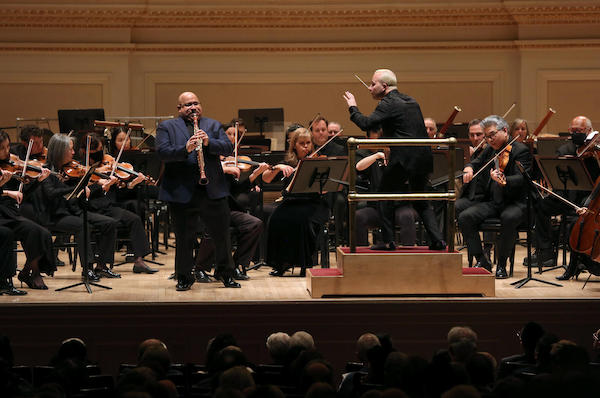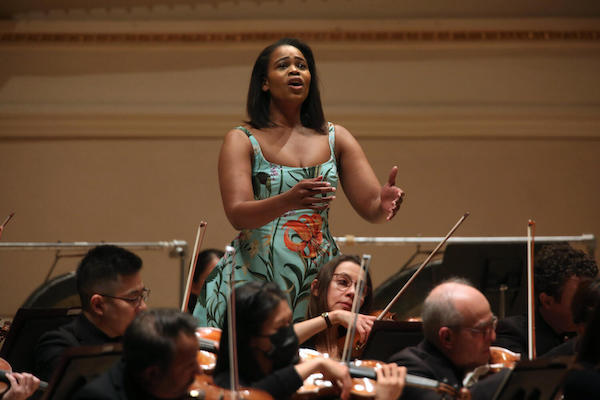Philadelphia Orchestra concert rises to an outstanding Mahler Fourth

The Philadelphia Orchestra’s visit to Carnegie Hall Tuesday night, with music director Yannick Nézet-Séguin and two soloists, was on paper a pro forma program; overture, concerto, symphony. The wrinkles were in the selections, meaning brand new contemporary composition, Mozart’s Clarinet Concerto, and after intermission Mahler’s Symphony No. 4.
The concert was itself pro forma at first, marking time with some small pleasures, then improving step by step to a strong finale.
Xi Wang’s Ensō—this was the first New York performance—was the opener. The title comes from a sacred Buddhist symbol, and the piece is meant to chart the historical Buddha’s spiritual journey. That inner experience, and hearing it, is highly subjective, and Xi’s means were oddly objective. That is, she cobbled together episodic fragments that referred to well-worn ideas from the modern era and the use of film cues.
This was technically skillful but had little expressive or emotional effect. Beginning with highly atmospheric orchestration, and a kind of slowed-down-Messiaen piano phase, the piece quickly moved through a series of disparate moods. These had the distancing feel of the familiar being presented as revelatory. Shades of Stravinsky turned on memories, but otherwise one noted the signifiers of feelings without actually feeling them. The orchestration’s playing sounded secure without quite flowing ideally.
The issue with the next piece wasn’t the expression, it was the performance. Or, half of it; soloist Ricardo Morales, the orchestra’s principal clarinetist, was sensational. He had an absolutely marvelous sound, soft but clearly defined, warm but with cool colors, beautifully formed and centered. It was so centered and well-supported that it penetrated the entire hall even in the quietist passages. Every phrase he played was utterly graceful and lovely, and details like his subtle rubato in the Adagio were superb, each note has a purpose and a meaning.
Against this, the orchestra was a bland presence. Nézet-Séguin had an odd and underwhelming perspective on Mozart, forming a sound that was nebulous. It was like beige wallpaper, with none of the highlights, details, and fine edges that are essential to Mozart’s style.
Fortunately, the concert concluded with a magnificent performance of Mahler’s Fourth. This was the opposite of the Mozart concerto; every detail was exact, refined, expressive. The tempo in the first movement was slightly faster than normal, an excellent choice as it set up a series of ideal tempo changes that move toward the satisfaction of the final resolution.

The scherzo was sharp and lively, with the right touch of acerbity. The ethereal slow movement was on the slow side, and there were moments when it was near static, but the orchestra kept it going. The low strings were especially fine, and throughout the woodwinds were fantastic, especially the double-reeds and English horn. Dynamics were well chosen, and the transitions, essential in Mahler, were outstanding, smooth yet full of tension.
Soprano Pretty Yende sang the solo part in the final movement, standing behind the violins. She was fine as Morales was in the concerto, with an expression that hit a fine balance between naïvete and wisdom, and subtle and deeply musical variations of phrasing and dynamics. If the evening was a slow journey to fulfillment, this performance delivered every satisfaction.
The Philadelphia Orchestra, Yannick Nézet-Séguin, and pianist Yuja Wang play an all-Rachmaninoff program, 8 p.m., Saturday, January 28, 2023. carnegiehall.org